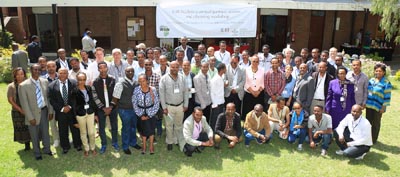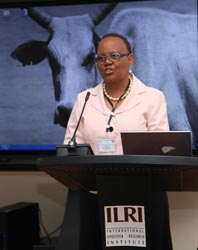| N2Africa-Ethiopia held its third Annual National Partners Review and Planning Workshop from 27-29 January 2016 at ILRI campus, Addis Ababa. The main objectives of the workshop were to review achievements, lessons learnt, challenges encountered during the 2015 season and to plan project activities for 2016 season. More than 90 participants representing 30 different partner institutions attended the meeting [Government Offices- BoA & NARS, NGOs, CGIAR, Private companies, FCU (farmers’ cooperative unions), BMGF, WUR etc.]. |  |
 |
Dr. Siboniso Moyo, program leader for Animal Science for Sustainable Productivity and ILRI Director General’s representative in Ethiopia, warmly welcomed the participants and gave opening remarks. She highlighted that the N2Africa has made significant progress since its launch in 2014. During its first year, the project promoted legume production technology among smallholder farmers in collaboration with only a handful of partners. Currently, N2Africa collaborates with about 30 partner institutions in many target Woredas (districts) and has established seven functional PPPs (private public partnerships) to strengthen legume value chain activities (technology dissemination, input supply and output market linkages). Finally, appreciating the achievements that the project gained during the past year, she wished for a very successful review and planning workshop. |
The N2Africa-Ethiopia country coordinator, Dr. Endalkachew Wolde-meskel, presented the overall achievements of the project during 2015 and indicated the tasks that the project should focus on in the coming season. He particularly emphasized the strengthening of the Farmers’ Cooperative Unions as a bridge for input supply and output market linkages, research on rhizobiology and non-responsive soils, gender issues, agribusiness and strengthening of market access to bring about economic benefit to smallholders.
During the workshop, the seven PPP clusters (North, South, Southeast, Central, Chewaka, Jimma and Pawe) presented their progress and future plans with a focus on ensuring long-term sustainability, knowledge transfer, legume technology dissemination, efficient input supply chains and access to markets. Cross-cutting issues such as ICT models, data flows and their outcomes and rhizobiology research efforts were presented. In addition, various posters were presented by private partners and a Union (ACOS, AKF, Balegreen, MBI, Guts Agro, Tsehay Union), thus providing an overview of their companies, challenges and opportunities in legume value chains. Another poster focused on the value of grain legume residues for intensification of crop-livestock systems in Ethiopia. PICS bags, effective against seed storage pests-weevils, were also demonstrated. In all sessions, participants were actively engaged in discussions. Questions and comments were received and responded as appropriate.
A general outline to plan activities in 2016 was presented by Mr. Tamiru Amanu, N2Africa BDO; partners then formed working groups around their PPP clusters. Overall, the 2016 planning will focus on strengthening the PPPs (as important drivers of the legume value chain), building up on previous efforts - technology dissemination, adaptation and market access to ensure farmers’ benefits. Also, inoculants quality control along the input supply chain, issues related to non-responsiveness and research on rhizobiology – collection and comparative symbiotic effectiveness will be important research priorities for NARS and universities.
Dr. Fred Kanampiu, N2Africa project coordinator, said that it is vital to look into the entire project and assure that no components are left behind while planning. The 2016 planning should take into consideration lessons learned from 2015, and also be looking into publications coming out. Dr. Charlene McKoin, Senior Project Officer at the Bill & Melinda Gates Foundation, shared her observations on the partnership clusters, poster presentations and field visits (which she had a few days before the workshop). She was impressed with the overall progress made by N2Africa-Ethiopia, with the organized partnership clusters, and uniquely fascinated by farmers’ feedback on technology evaluation events (at Ginir-Bale during her field visit).
Finally, Mr. Mulugeta Enki, Sourcing and Supply Chain Development Manager at Guts Agro Industry PLC, appreciated the synergies among partners to allocate their best resources (capital, staff, knowledge and time) to ensure the sustainability of the N2Africa vision. He also encouraged us to share the PPP models with other projects to scale research and development efforts.
Workshop materials can be accessed at: http://n2africa-ethiopia.wikispaces.com/N2Africa_Annual_Review%26Planning_Workshop_Jan.2016
By: N2Africa-Ethiopia Team (Birhan Abdulkadir, Tamiru Amanu, Endalkachew Wolde-meskel)
